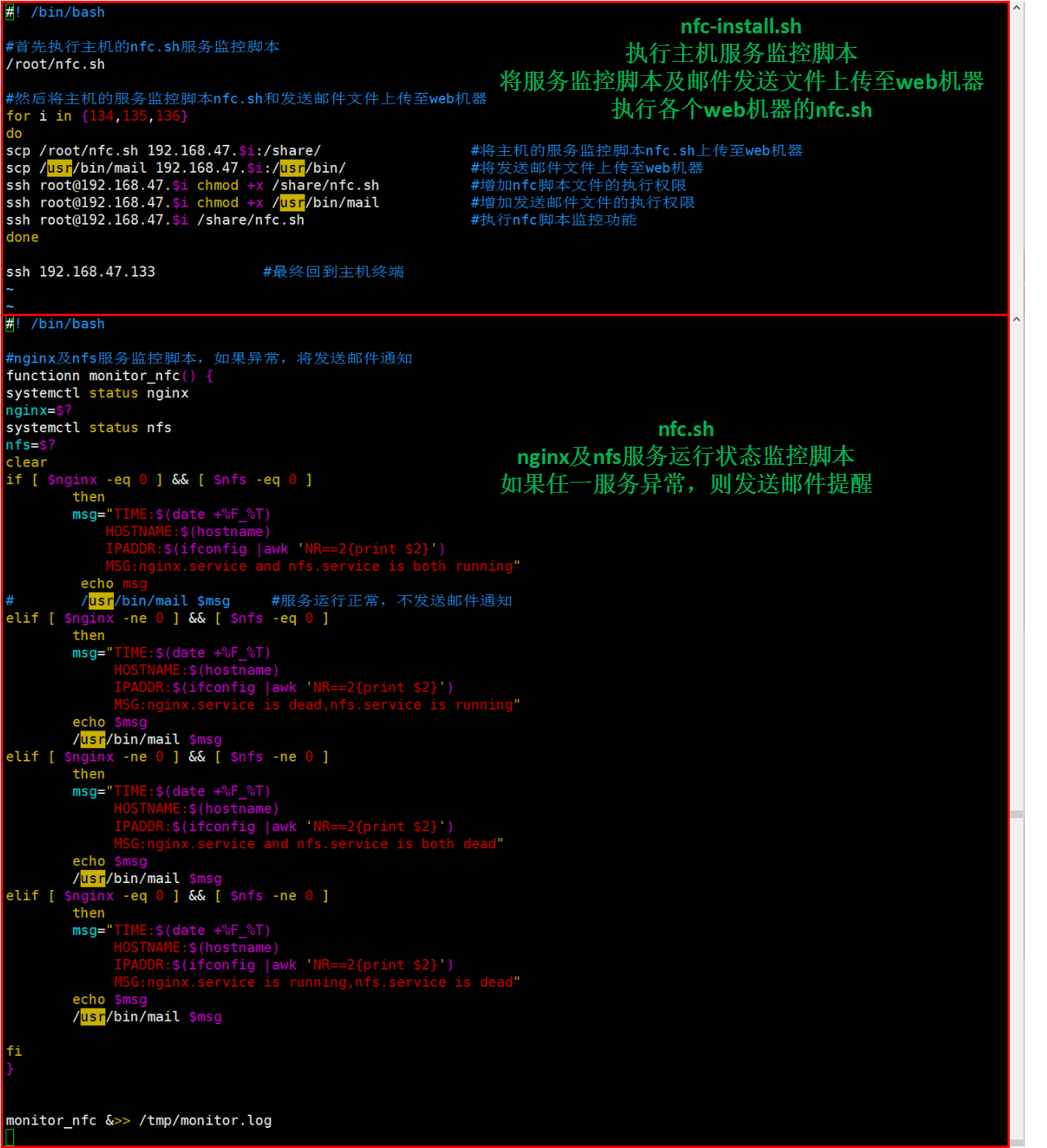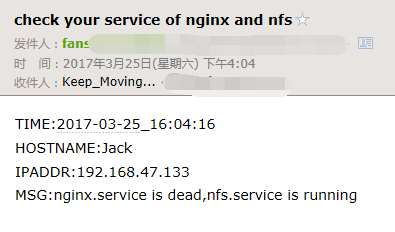Linux基础之-利用shell脚本实现自动监控系统服务,linuxshell
Linux基础之-利用shell脚本实现自动监控系统服务,linuxshell
目的:监控集群内nginx及nfs服务运行是否正常,如任一服务异常,则发送邮件通知用户
条件: 1. 主机及子机IP地址,hostname已确定;
2. 主机与子机能够免密通讯,即基于密匙通讯(相关命令:ssh-keygen;ssh-copy-id -i web1);
需要的文件:
1. python邮件发送工具;
2. nfc.sh监控脚本,监控nginx及nfs服务状态,并调用mail发送工具通知用户;
3. nfc-install.sh监控部署脚本,运行在主机,为子机配置文件,执行命令;
详细代码:
1. 邮件发送工具
将以下代码创建到“/usr/bin/mail”文件内,并赋予执行权限(chmod +x /usr/bin/mail)

#!/usr/bin/python # -*- coding: UTF-8 -*- import sys import smtplib import email.mime.multipart import email.mime.text server = 'smtp.163.com' port = '25' def sendmail(server,port,user,pwd,msg): smtp = smtplib.SMTP() smtp.connect(server,port) smtp.login(user, pwd) smtp.sendmail(msg['from'], msg['to'], msg.as_string()) smtp.quit() print('邮件发送成功email has send out !') if __name__ == '__main__': msg = email.mime.multipart.MIMEMultipart() msg['Subject'] = 'check your service of nginx and nfs' msg['From'] = 'python4_mail@163.com' msg['To'] = 'python4_recvmail@163.com' user = 'python4_mail' pwd = '123456789' content='%s\n%s' %('\n'.join(sys.argv[1:4]),' '.join(sys.argv[4:])) #格式处理,专门针对我们的邮件格式 txt = email.mime.text.MIMEText(content, _charset='utf-8') msg.attach(txt) sendmail(server,port,user,pwd,msg)View Code
python通过SMTP发送邮件失败:
错误1:smtplib.SMTPAuthenticationError: (550, b‘User has no permission‘)
我们使用python发送邮件时相当于自定义客户端根据用户名和密码登录,然后使用SMTP服务发送邮件,新注册的163邮箱是默认不开启客户端授权的(对指定的邮箱大师客户端默认开启),因此登录总是被拒绝,解决办法(以163邮箱为例):进入163邮箱-设置-客户端授权密码-开启(授权码是用于登录第三方邮件客户端的专用密码)
错误2:smtplib.SMTPAuthenticationError: (535, b‘Error: authentication failed‘)
以163邮箱为例,在开启POP3/SMTP服务,并开启客户端授权密码时会设置授权码,将这个授权码代替smtplib.SMTP().login(user,password)方法中的password即可。
2. nfc.sh监控脚本

#! /bin/bash #nginx及nfs服务监控脚本,如果异常,将发送邮件通知 function monitor_nfc() { systemctl status nginx nginx=$? systemctl status nfs nfs=$? clear if [ $nginx -eq 0 ] && [ $nfs -eq 0 ] then msg="TIME:$(date +%F_%T) HOSTNAME:$(hostname) IPADDR:$(ifconfig |awk 'NR==2{print $2}') MSG:nginx.service and nfs.service is both running" echo msg # /usr/bin/mail $msg #服务运行正常,不发送邮件通知 elif [ $nginx -ne 0 ] && [ $nfs -eq 0 ] then msg="TIME:$(date +%F_%T) HOSTNAME:$(hostname) IPADDR:$(ifconfig |awk 'NR==2{print $2}') MSG:nginx.service is dead,nfs.service is running" echo $msg /usr/bin/mail $msg elif [ $nginx -ne 0 ] && [ $nfs -ne 0 ] then msg="TIME:$(date +%F_%T) HOSTNAME:$(hostname) IPADDR:$(ifconfig |awk 'NR==2{print $2}') MSG:nginx.service and nfs.service is both dead" echo $msg /usr/bin/mail $msg elif [ $nginx -eq 0 ] && [ $nfs -ne 0 ] then msg="TIME:$(date +%F_%T) HOSTNAME:$(hostname) IPADDR:$(ifconfig |awk 'NR==2{print $2}') MSG:nginx.service is running,nfs.service is dead" echo $msg /usr/bin/mail $msg fi } monitor_nfc &>> /tmp/monitor.logView Code
3. nfc-install监控部署脚本

#! /bin/bash #首先执行主机的nfc.sh服务监控脚本 /root/nfc.sh #然后将主机的服务监控脚本nfc.sh和发送邮件文件上传至web机器 for i in {134,135,136} do scp /root/nfc.sh 192.168.47.$i:/share/ #将主机的服务监控脚本nfc.sh上传至web机器 scp /usr/bin/mail 192.168.47.$i:/usr/bin/ #将发送邮件文件上传至web机器 ssh root@192.168.47.$i chmod +x /share/nfc.sh #增加nfc脚本文件的执行权限 ssh root@192.168.47.$i chmod +x /usr/bin/mail #增加发送邮件文件的执行权限 ssh root@192.168.47.$i /share/nfc.sh #执行nfc脚本监控功能 done ssh 192.168.47.133 #最终回到主机终端View Code
详见图片

结果:
主机

子机1

参考资料
1. http://www.cnblogs.com/linhaifeng/p/6602149.html
评论暂时关闭